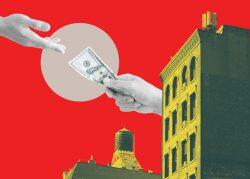In July, Kingston made history as the first city north of the New York City suburbs to adopt rent stabilization.
Now tenants in the Hudson Valley town aim to deliver landlords another blow: New York state’s first rent rollback.
Under state law, the freshly formed Kingston Rent Guidelines Board must vote on a rent adjustment. That decision, set for Nov. 9, can raise or lower rents for the 1,200 apartments now under rent stabilization.
Until then, rents on those units, which comprise 20 percent of the city’s rental housing, are frozen.
Ahead of a public hearing Tuesday night, the activist nonprofit For the Many called for a rent reduction, citing the unsustainable hikes tenants have faced throughout 2022.
“Some of the tenants at Stony Run, the largest building covered by the Emergency Tenant Protection Act, saw their rents increase recently by upwards of 20 percent,” said Brahvan Ranga, the group’s political director.
Read more



The group didn’t put a number on the decrease it wants. But it did call on the rent guidelines board to allow for a “ lookback period” in which newly stabilized tenants could challenge their current rents if they believed they suffered an unjust increase over the past two years.
Kingston Mayor Steve Noble, who greenlit rent stabilization this summer, attributed rent increases to lagging development and landlords pushing prices to what the market would bear.
“We saw people taking advantage of [low supply] by creating this emergency by raising rents to levels that we had never seen before in Kingston,” Noble said.
But after explaining how the shortage of rentals pushed prices up, the mayor said, “A 30 percent, a 40 percent increase that some of our tenants saw over the last two years is completely inappropriate.”
Though striking, the hikes Kingston tenants have faced are in line with what many U.S. renters faced through 2022.
Rents fell early in the pandemic, then shot back up as tenants returned to cities on the heels of vaccine rollouts. Median, year-over-year rent growth nationwide topped out at 19.8 percent in January, according to Realtor.com.
Some New York City market-rate tenants saw hikes as high as 50 percent this spring and summer as Covid discounts died, although most increases were far lower.
Advocates for rent-stabilized units in New York City have pushed for a rent rollback two years’ running. Both attempts were unsuccessful. In 2021, the Rent Guidelines Board approved a half-year freeze, then a 1.5 percent hike. This year’s vote bumped rents 3.5 percent for new leases beginning Oct. 1.
Kingston’s rent board, like New York City’s, has nine members: two tenant representatives, two from the landlord camp and five public members. A For The Many staffer occupies one of the public seats. Another remains vacant.
The advocacy group hopes a rent rollback paves the way for other cities and counties to follow suit. Nassau, Rockland and Westchester rent guidelines boards will vote early next summer.
Meanwhile, campaigns are underway to conduct vacancy surveys — the first step toward declaring a housing emergency that allows for rent stabilization — in Albany, Buffalo, Newburgh, Syracuse, and Rochester.
“We’ve spoken directly with elected officials that have said the Kingston law provided them momentum and has reignited the conversation around conducting these vacancy studies,” Ranga told Next City earlier this year.
